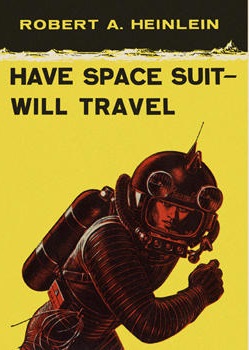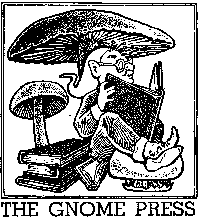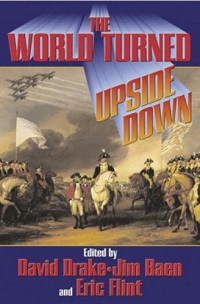
Have Space Suit—Will Travel is a science fiction novel for young readers by American writer Robert A. Heinlein, originally serialized in The Magazine of Fantasy & Science Fiction and published by Scribner's in hardcover in 1958. The last Heinlein novel to be published by Scribner's, it was nominated for a Hugo Award in 1959 and won the Sequoyah Children's Book Award for 1961. Heinlein's engineering expertise enabled him to add realistic detail; during World War II, he had been a civilian aeronautics engineer at a laboratory which developed pressure suits for use at high altitudes.

Alien invasion or space invasion is a common feature in science fiction stories and films, in which extraterrestrial lifeforms invade Earth to exterminate and supplant human life, enslave it, harvest people for food, steal the planet's resources, or destroy the planet altogether. It can be considered as a science-fiction subgenre of the invasion literature, expanded by H. G. Wells's seminal alien invasion novel The War of the Worlds, and is a type of 'first contact' science fiction.

X Minus One is an American half-hour science fiction radio drama series that was broadcast from April 24, 1955, to January 9, 1958, in various timeslots on NBC. Known for high production values in adapting stories from the leading American authors of the era, X Minus One has been described as one of the finest offerings of American radio drama and one of the best science fiction series in any medium.
The Golden Age of Science Fiction, often identified in the United States as the years 1938–1946, was a period in which a number of foundational works of science fiction literature appeared. In the history of science fiction, the Golden Age follows the "pulp era" of the 1920s and 1930s, and precedes New Wave science fiction of the 1960s and 1970s. The 1950s are, in this scheme, a transitional period. Robert Silverberg, who came of age then, saw the 1950s as the true Golden Age.

Gnome Press was an American small-press publishing company primarily known for publishing many science fiction classics. Gnome was one of the most eminent of the fan publishers of SF, producing 86 titles in its lifespan — many considered classic works of SF and Fantasy today. Gnome was important in the transitional period between Genre SF as a magazine phenomenon and its arrival in mass-market book publishing, but proved too underfunded to make the leap from fan-based publishing to the professional level. The company existed for just over a decade, ultimately failing due to inability to compete with major publishers who also started to publish science fiction. In its heyday, Gnome published many of the major SF authors, and in some cases, as with Robert E. Howard's Conan series and Isaac Asimov's Foundation series, was responsible for the manner in which their stories were collected into book form.

Saturn has made appearances in fiction since the 1752 novel Micromégas by Voltaire. In the earliest depictions, it was portrayed as having a solid surface rather than its actual gaseous composition. In many of these works, the planet is inhabited by aliens that are usually portrayed as being more advanced than humans. In modern science fiction, the Saturnian atmosphere sometimes hosts floating settlements. The planet is occasionally visited by humans and its rings are sometimes mined for resources.

Asteroids have appeared in fiction since at least the late 1800s, the first one—Ceres—having been discovered in 1801. They were initially only used infrequently as writers preferred the planets as settings. The once-popular Phaëton hypothesis, which states that the asteroid belt consists of the remnants of the former fifth planet that existed in an orbit between Mars and Jupiter before somehow being destroyed, has been a recurring theme with various explanations for the planet's destruction proposed. This hypothetical former planet is in science fiction often called "Bodia" in reference to Johann Elert Bode, for whom the since-discredited Titius–Bode law that predicts the planet's existence is named.

In the Courts of the Crimson Kings is a 2008 alternate history science fiction novel by American writer S. M. Stirling.

Two Complete Science-Adventure Books was an American pulp science fiction magazine, published by Fiction House, which lasted for eleven issues between 1950 and 1954 as a companion to Planet Stories. Each issue carried two novels or long novellas. It was initially intended to carry only reprints, but soon began to publish original stories. Contributors included Isaac Asimov, Robert A. Heinlein, Arthur C. Clarke, Poul Anderson, John Brunner, and James Blish. The magazine folded in 1954, almost at the end of the pulp era.

Modern Masterpieces of Science Fiction is an anthology of science fiction short stories, edited by Sam Moskowitz. It was first published in hardcover by World Publishing Co. in 1965, and reprinted by Hyperion Press in 1974. It was split into three separate paperback anthologies published by MacFadden-Bartell; Doorway Into Time (1966), The Vortex Blasters (1968) and Microcosmic God (1968); the paperback editions omitted Moskowitz's introduction and the story by Robert Bloch.

Grand Masters' Choice is an anthology of science fiction short stories edited by Andre Norton and Ingrid Zierhut. It was first published as the convention book for Noreascon Three in a limited edition hardcover by NESFA Press in August 1989. The first paperback edition was published by Tor Books in October 1991. The paperback edition credited Norton alone as editor.

The World Turned Upside Down is an anthology of science fiction and fantasy short stories edited by David Drake, Eric Flint and Jim Baen. It was first published in hardcover and ebook by Baen Books in January 2005; a Science Fiction Book Club edition followed from Baen Books/SFBC in February of the same year. The first paperback edition was issued by Baen in June 2006.

Timescapes: Stories of Time Travel is an anthology of science fiction short stories on time travel edited by Peter Haining. It was first published in the United Kingdom hardcover by Souvenir Press in August 1997. The first American edition was issued in hardcover under the alternate title Time Travelers: Fiction in the Fourth Dimension by Barnes & Noble Books in 1998.

My Best Science Fiction Story is an anthology of science fiction short stories edited by Leo Margulies and Oscar J. Friend. It was first published in hardcover by Merlin Press in November 1949, and reprinted in August 1950. An abridged paperback edition including twelve of its twenty-five stories was published by Pocket Books in July 1954 and reprinted in November 1955.
The year 1950 was marked, in science fiction, by the following events.
The year 1952 was marked, in science fiction, by the following events.
The year 1953 was marked, in science fiction, by the following events.
The year 1955 was marked, in science fiction, by the following events.